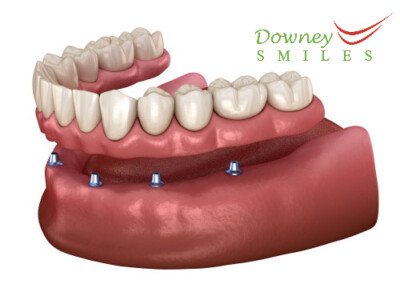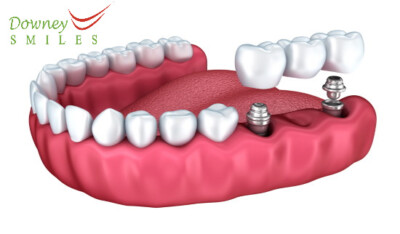 Dental implants are metal posts surgically inserted into the jawbone beneath the gums. They are prostheses that look and work like natural teeth to replace missing or damaged teeth. Endosteal and subperiosteal dental implants are the most common types of dental implant surgeries. Dr. Amit Shah DDS has over 20+ years of experience in dental implant surgery since 2002 and will help you restore your smile! Schedule an appointment with our office to go over Same Day Implants and Full Mouth Dental Implants options.
Dental implants are metal posts surgically inserted into the jawbone beneath the gums. They are prostheses that look and work like natural teeth to replace missing or damaged teeth. Endosteal and subperiosteal dental implants are the most common types of dental implant surgeries. Dr. Amit Shah DDS has over 20+ years of experience in dental implant surgery since 2002 and will help you restore your smile! Schedule an appointment with our office to go over Same Day Implants and Full Mouth Dental Implants options.
Table of Contents
What is a Dental Implant?
A dental implant is a post surgically implanted into the upper or lower jaw. It functions similarly to a tooth’s root making it a firm anchor for replacement teeth. Once they are implanted into the jawbone, dental implants allow the dentist to attach artificial teeth to them.
What are different types of dental implant?
- Endosteal Implants – These implants are directly inserted into the jawbone. It is the most common type of dental implant procedure. Endosteal implants typically resemble tiny screws and are made of titanium.
- Subperiosteal Implants – These types of dental implants are placed beneath the gum and consist of a metal frame with a connected post. The gum then heals around it in order to keep the frame in place.
What are steps for Dental Implant placement?
Step 1: Bone Grafts, Gums and Evaluation for dental implant
First, the health of your jawbone is thoroughly examined by your dentist or oral surgeon. To ensure that your implant looks as natural as possible, your dentist will do an evaluation that includes dental X-rays, impressions, and tooth color matching. Secondly, you need to talk about your health issues and the medications that you are currently taking. You can be asked to take antibiotics before surgery to prevent infection. Thirdly, your dentist creates your treatment plan for your specific situation. Your dentist takes many aspects into account when personalizing your treatment plan. The number of missing teeth and the condition of your jawbone and remaining teeth are the two primary factors that your dentist will consider. Preoperative procedures like bone grafting or gum lift may be required if you have significant gum recession or insufficient jawbone density.
Step 2: Titanium Post placement for dental implant
During dental implant surgery, your oral surgeon creates a cut to expose the gum and bone. Then, holes are bored into the bone for the implant’s insertion. The dental implant serves as the tooth’s root; therefore, it is inserted deeply into the bone.
Step 3: Healing Period for dental implant
After the implant post is placed into the jawbone, osseointegration takes place. The jawbone starts to attach to and fuse with the implant’s surface during this stage. This procedure, which can take many months, aids in creating a solid base for your new prosthetic tooth.
Step 4: Abutment and Crown Fabrication for dental implant
Once osseointegration is complete, you will need additional surgery to place the abutment. The crown will eventually be attached to this metal connector, which is called an abutment. Reopening the gum to expose the dental implant and attaching the abutment to it are included in this minor procedure. After the insertion of the abutment, your gums need to heal for roughly two weeks before the prosthetic tooth may be attached. Your dentist will create a prosthetic tooth or crown using dental impressions once your gums have healed.
Make an Appointment with Dr. Amit Shah for Dental Implants Surgeon Consultation near
* FREE Dental Implants Smile Consultation ($100 Value)
* FREE Digital X-rays especially for Tooth Implant ($150 Value)
* We Maximize your Insurance so you pay less out of pocket.
* 0% Interest Financing for 18 month (check if Doctor offers this)
Dr. Amit Shah at Best Smiles Dental provides the best quality dental implants at a cost that our neighbors near can afford. Call us at (562) 479-7722 to schedule an appointment.
Am I a good Candidate for Dental Implants?
You are a good candidate for dental implant surgery if your teeth and overall health are in good condition. You must have healthy gums free of periodontal disease and a suitable quantity of jawbone density.
When is a tooth implant not recommended?
You are not a good candidate for dental implant surgery if you have insufficient jawbone, gum disease, or other health problems. Uncontrolled cancer, immune system troubles, blood clotting abnormalities, diabetes, and drug abuse are a few of these medical conditions.
How painful is a dental implant procedure?
Approximately, a patient often experiences discomfort on a scale of 2 to 3 in the first 24 to 48 hours following implant surgery. This is based on a scale of one to ten. One denotes minimal discomfort, whereas 10 denotes extreme pain. Patients with healthy bones and those who do not need major soft tissue surgery should only experience this amount of pain. Tylenol or Advil are examples of over-the-counter medicines that help ease their discomfort.
What results can be expected from Dental implant?
You can anticipate having permanent teeth that are just as durable as your natural teeth if the osseointegration was successful. In contrast to dentures, dental implants are permanently inserted; thus, there won’t be any embarrassing slippage.
What are the advantages of Dental implants?
- Teeth implants function and feel like natural teeth.
- Gum disease is less likely to develop with dental implants.
- Dental implants last a lifetime with proper maintenance.
- Dental implants prevent face sagging and early signs of aging.
- Adjacent teeth are stabilized by dental implants.
- Dental implants stop changes to your face shape.
- Teeth implants enhance your bite force.
- Bone loss is stopped with dental implants.
- Cavities cannot form on teeth implants.
- Speech quality is improved with dental implants.
- Dental implant maintenance is easy and simple.
What are the disadvantages of Dental implants?
- Bone loss is possible around the dental implants.
- Prosthetic teeth require to be changed every few years.
- Dental implants have a longer recovery period.
- Teeth implants are not for everyone.
- Dental implants necessitate multiple appointments.
- Dental implants are typically not covered by most insurance providers.
- Implants require extensive surgery.
- Dental implant surgery has the risk of complications.
- Teeth implants need additional surgical procedures if there is insufficient bone mass.
Is dental implant safe and what is the success rate of dental implant?
Dental implants surgery is known to be safe. In dentistry, dental implants have been used successfully for more than 30 years. According to a study that was published in the International Journal of Implant Dentistry, the success rate for implant placement over a ten-year period was between 90 and 95 percent. The risk of serious complications or problems following dental implant surgery is practically negligible for the great majority of people in good health.
How much do Dental implant cost?
On average, the price of a single dental implant ranges from $1,500 to $6,000. However, there are other costs that should be considered. The crown and abutment are included in these costs. Typically, an abutment costs around $300 to $500. A crown, on the other hand, usually costs between $1,000 and $2,000. Nevertheless, there are many ways to reduce the cost of dental implants. These consist of financing options, dental insurance, and discounted treatments at dental schools.
FAQs for Dental Implants
How long does a Dental Implant last?
According to the studies published in the International Journal of Implant Dentistry, dental implants are made to be permanent. This is a result of osseointegration, a process through which dental implants integrate with the surrounding bone tissue. Nevertheless, the crown that is attached to the implant needs to be changed due to wear and tear over time. Approximately 50-80% of crowns need to be replaced in 15 to 20 years.
Do gums grow around Implants?
Your gums slowly grow around the dental implants as you recover from your surgery. This is so that the gums can support your implants just like they do for your real teeth. To ensure that the gums don't grow over the implant, your dentist keeps an eye on your gum development during the healing phase.
What are Full Mouth Dental Implants?

Full mouth dental implants are designed to replace most or all of your teeth. They typically require 12 to 16 implants or 6 to 8 implants for each jaw (upper and lower). There are five options for for full mouth implants. They are All on 4 dental implants, All on 6 implants, zirconia full arch, full-implant without dentures, and implant-supported dentures.
What are Same Day Dental Implants?

The patient can receive both the implant and prosthetic tooth in just one appointment with same day dental implants. Instead of requiring multiple dental visits, the full procedure is completed in just one day. The key benefit of same day implants over other dental implant options is that the patient can return to a regular, healthy life much sooner with a fully restored smile. People who only have one or more missing teeth, have enough healthy jawbone tissue, don’t smoke, have good oral hygiene habits, and don’t grind their teeth excessively are suitable candidates for same day implants.
What are Mini Dental Implants?

Mini dental implants are one-piece screws little less than 3 millimeters (mm) or slightly more than 1/10 of an inch in diameter. Mini dental implants offer eight benefits. They have the potential to fit into smaller portions of your mouth and have less invasive surgery, a quicker recovery time, lower expenses, only need minimal jawbone mass, the capacity to be performed without the use of bone grafts, faster results, and less pain during insertion and repair. Nevertheless, they are not for everyone. Mini implants are not advised for those who grind their teeth frequently, smoke, have certain medical problems including diabetes, are undergoing chemotherapy or radiation treatment, or take any medications that inhibit bone healing.
How much do Dental implant cost?
On average, the price of a single dental implant ranges from $1,500 to $6,000. However, there are other costs that should be considered. The crown and abutment are included in these costs. Typically, an abutment costs around $300 to $500. A crown, on the other hand, usually costs between $1,000 and $2,000. Nevertheless, there are many ways to reduce the cost of dental implants. These consist of financing options, dental insurance, and discounted treatments at dental schools.
FAQs for Dental Implants
How long does a Dental Implant last?
According to the studies published in the International Journal of Implant Dentistry, dental implants are made to be permanent. This is a result of osseointegration, a process through which dental implants integrate with the surrounding bone tissue. Nevertheless, the crown that is attached to the implant needs to be changed due to wear and tear over time. Approximately 50-80% of crowns need to be replaced in 15 to 20 years.
Do gums grow around Implants?
Your gums slowly grow around the dental implants as you recover from your surgery. This is so that the gums can support your implants just like they do for your real teeth. To ensure that the gums don't grow over the implant, your dentist keeps an eye on your gum development during the healing phase.
